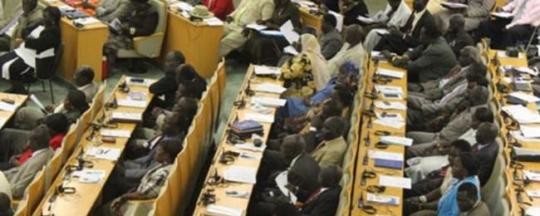'Focus on the Agreement' is a new daily segment broadcast on Radio Tamazuj to explain the contents of the peace deal signed in August 2015 between South Sudan's warring parties. In the previous two episodes we explained how the different parties will share power in the national cabinet. Today we look at what the deal says about power-sharing in the parliament.
Last year the South Sudanese parliament removed 23 members on the grounds that they had absented themselves for 12 successive sittings without permission. Some of the ousted members had fled into exile while others were active members of the rebel SPLM-IO. Most of the ousted MPs were members of the Shilluk or Nuer ethnic groups and a few were Equatorians, including Riek Machar's deputy Alfred Lado Gore.
Chapter 1, Article 11 of the peace agreement says that parliament members who were removed since the start of the crisis in December 2013 shall be reinstated in their seats. The peace agreement also says that the parliament will be expanded from 332 members to 400 members. All of additional 68 members will belong to opposition groups.
The SPLM-IO loyal to Riek Machar will appoint 50 new parliament members, the SPLM-FD led by Pagan Amum will appoint one new member, and the other non-armed political parties will appoint 17 new members.
The agreement says that these members will serve in parliament throughout the transitional period until elections are held.
Another provision of the peace agreement mandates that the Speaker of the Assembly must hail from the Equatoria region. He will be selected by the new assembly after the expansion is completed.
The role of the assembly is defined by the Constitution of 2011 and the peace agreement does not change this.
Finally, the peace agreement says that the upper house of South Sudan's parliament, the Council of States, will remain the same. Any members previously ousted from the Council of States will be restored to their positions, but otherwise it will remain the same size as it was before the war.



